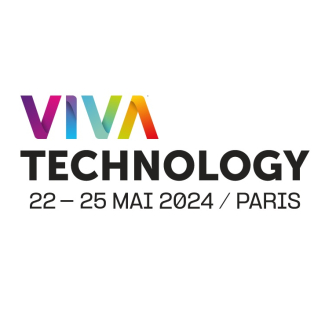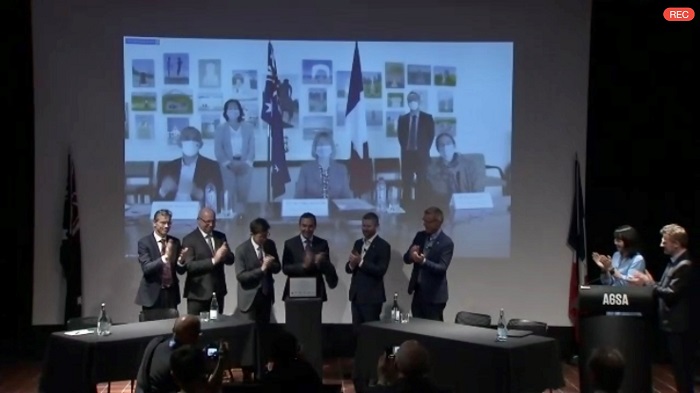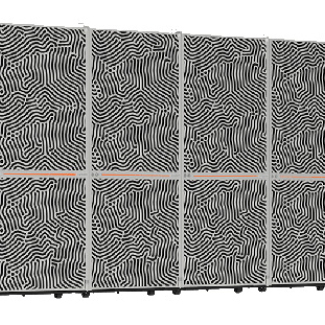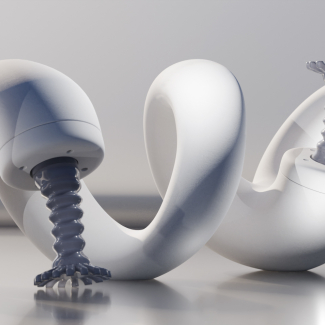
A Franco-Australian laboratory working towards better collaboration between humans and artificial intelligence
• A new laboratory has been created by the CNRS in Australia, in cooperation with three major Australian universities, IMT Atlantique and Naval Group, the European leader in naval defence.
• Its main objective: to develop new ways for humans to work with robots and autonomous systems.
• This collaboration between complementary partners will solve scientific problems, specifically those encountered by Naval Group.
The new international laboratory Crossing1
(CNRS/IMT Atlantique/The University of Adelaide/University of South Australia/Flinders University/Naval Group) will provide solutions for efficient and ethical collaboration between humans, artificial intelligence (AI) and autonomous systems. Established in Australia and launched on 22 February 2021, it will strengthen already rich scientific collaborations between France and Australia.
- 1For « frenCh austRalian labOratory for humanS / autonomouS agents teamING »
This laboratory project, located in Adelaide, Australia, is based on the premise that multidisciplinary collaborations are needed to address research jointly involving humans, AI and autonomous systems. Specialists in AI, artificial vision, virtual and augmented reality and signal and image processing will pool their expertise alongside experts in human-machine interactions, cognitive and physiological psychology, neuroscience, embedded and autonomous systems and design within the new Crossing laboratory, which will be launched on 22 February 2021.
The launch ceremony will be opened by the Premier of South Australia, the Honourable Steven Marshall, in the presence of Jean-Pierre Thebault, Ambassador of France to Australia and Pierre-Eric Pommellet, Chairman and CEO of Naval Group. Gillian Bird, Australia's ambassador to France Antoine Petit, CNRS Chairman and CEO, and Anne Beauval, IMT Atlantique Vice-President will join them by videoconference from Paris. Peter Høj, David G. Lloyd and Colin Stirling, Vice-Chancellors from the Universities of Adelaide, South Australia and Flinders, will participate in a roundtable with the CEOs of Naval Group, the CNRS and IMT Atlantique.
Crossing will develop four research pillars, which will support industries such as health, defence and "Industry 4.0":
- To improve models and our understanding of humans as individuals and groups;
- To improve the efficiency and implementation of learning algorithms within the environment and the group;
- To explore new interaction paradigms and improve understanding of how autonomous systems behave and make decisions;
- To propose ways of managing tasks and teams for hybrid teams.
Each partner will provide complementary expertise. The University of Adelaide, recognized worldwide in the field of AI, will provide Crossing scientists with access to the exceptional calculation resources at the Australian Institute of Machine Learning (AIML). The university will also provide robotic platforms, testing spaces and advanced physiological measurement equipment. For its part, Flinders University, recognized for its expertise in the field of autonomous marine vehicles, will provide Crossing with the state-of-the-art equipment at the Centre for Maritime Engineering, Control, and Imaging (CMECI). The University of South Australia will offer the unique resources of its internationally recognized centre for sleep and fatigue studies (Sleep, Chronobiology and Cognitive Neuroscience Research Labs). It will also provide priority access to a first-class laboratory dedicated to augmented reality and to its design resources, which scientists will use to make prototypes for testing human-machine interfaces. Finally, Naval Group will provide an industrial vision for the development of leading-edge fundamental research. The group will put to use its expertise in the fields of intelligence and embedded architectures, unmanned vehicles, industry of the future and human performance measurement in this laboratory.
Crossing will be an unparalleled workplace for scientists at CNRS, IMT Atlantique, Naval Group and their academic partners, who wish to make short- or long-term research stays in Adelaide.
Antoine Petit, Chairman and CEO, CNRS, said that “The establishment of this International Research Laboratory, the first of its kind in Australia, reflects the recent dynamism of the partnerships set up with that country. The CNRS now enjoys a privileged position among Australia's foreign scientific partners, and it intends to enhance its presence there through the development of new projects and networks.”
Professor Peter Høj, Vice-Chancellor and President, the University of Adelaide:
“CNRS has 70 international research labs around the world, and Crossing Lab will be the first international research lab in Australia, and only the fifth of its type in the world and will offer an enduring link to the CNRS, the largest fundamental science organisation in Europe.”
“It provides an opportunity for South Australian universities to build strong collaborations with CNRS and European partners to apply to European as well as Australian funding schemes, and to engage with industry in Europe with CNRS collaborators.”
Professor David Lloyd, Vice-Chancellor and President, the University of South Australia:
“This new lab is set to boost both Australian-French scientific cooperation and Australian sovereign technical capability.”
“We are proud to be contributing our world-leading expertise in key areas that connect human factors with the physical aspects of maritime vehicles in novel ways.“
“Our interdisciplinary research includes psychophysiology and behaviour, metrics-based ergonomic design, virtual reality and augmented reality.”
Professor Colin Stirling, Vice-Chancellor and President, Flinders University:
“The combined research strengths of South Australia’s three world-class universities, Naval Group and some 33,000 CNRS staff represents a global powerhouse of expertise.”
“This landmark collaboration further lifts South Australia’s internationally regarded defence research capacity and will contribute to the take up of advanced technologies by industry by devising effective and safe ways for people to work with machines that effectively ‘think’ for themselves.”
Mr Pierre Eric Pommellet, CEO of Naval Group:
“Naval Group is proud to be the industry partner for the new International Research Lab. We are honoured by the trust of our Australian and French partners, and the opportunity to make this a cornerstone of international scientific breakthrough. As one of only five labs with industrial partner opened by CNRS, this world leading research laboratory, based in Adelaide, supports our commitment to ongoing global innovation. Supported by our subsidiary Naval Group Pacific, this partnership will help Australia realise and fulfill its innovation roadmap across a broad spectrum of sectors.”
Professor Anne Beauval, Vice-Presdent IMT-Atlantique:
“Australia is a country where IMT Atlantique is actively developing its international strategy, building on 15 years of collaborations. It positioned itself in the favourable context of the strengthened partnerships between France and Australia in the field of higher education and research, by proposing the creation of the Western Alliance for Scientific Action with Australia (Wasaa) in 2018 which has enabled the increase of students and researchers exchanges between our two countries.
The CROSSING Lab is another dimension in which IMT Atlantique is joining forces with academic and industrial partners to strengthen our positioning in Australia. IMT Atlantique has especially set cooperation axes with Naval Group Research (and more generally Naval Group) about submarine communication and detection, ocean monitoring as well as digital transformation at different levels of practice (industrial management, command & control). These cooperations are already supported through chairs and collaborative projects and will contribute to consolidating and enriching the CROSSING Lab”.



